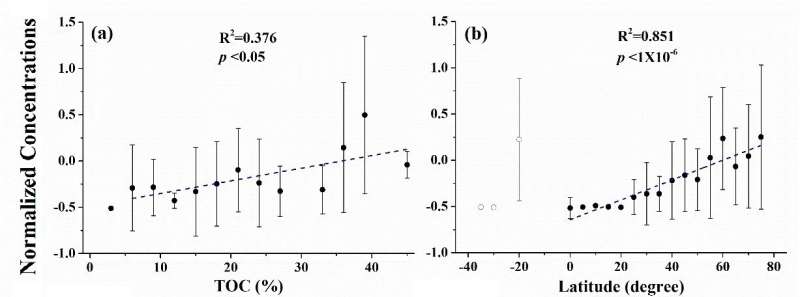Fig. 2 The influence of soil organic carbon (TOC) and latitude on the distribution of POPs in forest soil. Credit: ITPCAS
Forests can regulate the global dispersion of persistent organic pollutants (POPs). In theory, the forest plays as a "sink" and delays the transport of POPs to remote/cold regions.
Dr. GONG Ping from the Institute of Tibetan Plateau Research of the Chinese Academy of Sciences (ITPCAS) and his colleagues systematically reviewed the cycling mechanism of POPs in forests. The study was published in Nature Reviews Earth & Environment on Feb. 23.
The researchers emphasized that pollutants are taken up by foliage and transported to the forest floor, which accelerated the migration of POP deposition from air to soil. Rain washing of the leaves also contributed to the acceleration.
They collected published data to explore the distribution of POPs in global forests. Statistic results showed that organic carbon was a key factor in controlling the accumulation of POPs in forest soils. The relatively high levels of organic carbon in forest soils in middle and high latitudes reflected the role of forests on hindering POPs transmission to the Arctic.
Based on this statistics, the researchers estimated the global storage of POPs in forest vegetation and soil, POP deposition flux under forest canopy, and storage changes of POPs caused by forest changes (the increase or decrease of forest area and the release from forest fires).
Generally, the annual release of POPs caused by forest changes is about 10% of the annual deposition flux in forest regions. But for some compounds (such as polychlorinated biphenyls and polycyclic aromatic hydrocarbons), their annual release has been close to or even exceeded the annual deposition flux. This indicated that forest changes were significantly changing the "source-sink" relationship of POPs and the processes of global transport.
By scanning the gaps of forest POPs studies, the researchers proposed to strengthen the research in key areas (tropical rainforests and boreal forests) and of key processes (such as dry and wet deposition, POPs transmission in forest food webs) at macroscale.
More information: Ping Gong et al. Persistent organic pollutant cycling in forests, Nature Reviews Earth & Environment (2021). DOI: 10.1038/s43017-020-00137-5
Provided by Chinese Academy of Sciences























